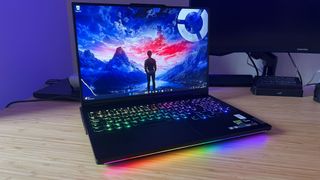
Gaming laptops have become increasingly powerful, rivaling desktops in performance and portability.
Choosing the best gaming laptop and also know How Long Do Gaming Laptops Last? can be overwhelming with so many models available. Focusing on the key features ensures you get the most out of your investment while meeting your gaming needs.
Here are the top five essential features to prioritize when shopping for a gaming laptop.
1. Graphics Card (GPU): The Core of Gaming Performance
The GPU (Graphics Processing Unit) is the most critical component in a gaming laptop. It determines how well your laptop can handle graphics-intensive games and tasks like video rendering or 3D modeling.
Top GPU Options:
- NVIDIA GeForce RTX Series: Models like RTX 3060, 3070, 3080, or the newer RTX 4000 series are ideal for smooth, high-frame-rate gaming.
- AMD Radeon RX Series: A great alternative, offering competitive performance and value.
Why It Matters:
A powerful GPU ensures smooth gameplay, higher resolutions, and the ability to play games at ultra settings. It also supports advanced technologies like ray tracing and DLSS (Deep Learning Super Sampling), which enhance visual quality.
2. Processor (CPU): Speed and Efficiency
While the GPU is critical for gaming, the CPU (Central Processing Unit) ensures your system runs smoothly overall. It handles game logic, physics calculations, and multitasking, such as streaming while gaming.
Recommended CPUs:
- Intel Core i7/i9 or AMD Ryzen 7/9 for high-performance gaming and multitasking.
- Intel Core i5 or AMD Ryzen 5 for casual gaming and lighter workloads.
Pro Tip: Choose a CPU with multiple cores and high clock speeds (e.g., 3.5 GHz or higher) for the best performance.
3. Display: Resolution, Refresh Rate, and Size
The display significantly impacts your gaming experience. A good screen enhances visuals, making games more immersive.
Key Factors to Consider:
- Resolution: Full HD (1920×1080) is the standard, but QHD (2560×1440) or 4K (3840×2160) resolutions provide sharper images.
- Refresh Rate: High refresh rates (120Hz, 144Hz, or even 240Hz) ensure smoother motion, especially for fast-paced games.
- Size: 15.6-inch displays balance portability and immersion, while 17.3-inch screens offer a larger, more cinematic experience.
Pro Tip: For competitive gamers, prioritize refresh rates over resolution to gain an edge in responsiveness.
4. RAM and Storage: Speed Meets Capacity
Adequate RAM and fast storage are essential for smooth gameplay and quick load times.
RAM Recommendations:
- 8GB: Minimum for casual gaming.
- 16GB: Ideal for most gamers; allows multitasking without lag.
- 32GB: Necessary for heavy multitasking or running memory-intensive games and applications.
Storage Options:
- SSD (Solid State Drive): Faster load times and better overall performance. Look for NVMe SSDs for the best results.
- HDD (Hard Disk Drive): Provides additional storage at a lower cost. Best used in combination with an SSD.
Ideal Setup: A laptop with a 512GB SSD for games and OS, paired with a 1TB HDD for extra storage.
Also Read: Why is my laptop so slow?
5. Cooling System: Stay Cool Under Pressure
Gaming laptops generate significant heat during intense gaming sessions. A robust cooling system prevents overheating, ensuring consistent performance and protecting components from damage.
Cooling Features to Look For:
- Vapor Chamber Cooling: Efficient heat dissipation for high-performance GPUs and CPUs.
- Dual-Fan Systems: Improved airflow for better cooling.
- Customizable Fan Controls: Allows you to adjust fan speeds based on your activity.
Pro Tip: Consider a laptop cooling pad for added support during long gaming marathons.
Additional Features to Consider
While the above five are essential, other features can enhance your gaming experience:
- Keyboard: Look for RGB lighting, anti-ghosting, and tactile feedback.
- Battery Life: Gaming laptops typically have short battery life, but some models, like the ASUS ROG Zephyrus, are optimized for longer usage.
- Ports: Ensure the laptop has enough USB, HDMI, and Thunderbolt ports for peripherals.
- Build Quality: A sturdy chassis ensures durability, while lightweight models are easier to carry.
Conclusion
Choosing the right gaming laptop involves balancing performance, display quality, and portability. By focusing on essential features like the GPU, CPU, display, RAM, and cooling system, you can find a laptop that delivers exceptional gaming experiences and meets your long-term needs.
Whether you’re an eSports competitor, a casual gamer, or a creative professional, investing in the right gaming laptop ensures you’re equipped for the challenges of today’s demanding games.





Leave a Reply